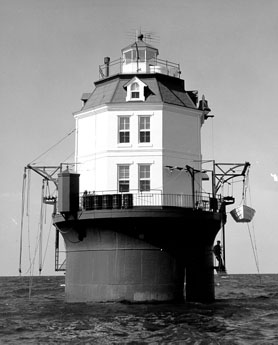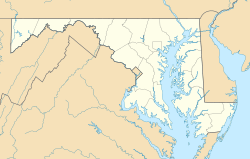Point No Point Light (Maryland) facts for kids
 |
|
| Undated photograph of Point No Point Light, Maryland (USCG) | |
|
|
|
| Location | off west shore of the Chesapeake Bay, Maryland north of the mouth of the Potomac River |
|---|---|
| Coordinates | 38°07′41″N 76°17′24″W / 38.128°N 76.29°W |
| Year first constructed | 1905 |
| Year first lit | 1905 |
| Automated | 1938, but remained manned until 1962 |
| Foundation | Pneumatic caisson |
| Construction | Brick |
| Tower shape | Octagonal |
| Focal height | 52 ft (16 m) |
| Original lens | original: fourth order Fresnel lens current: 14.8 inches (375 mm) |
| Range | 9 nautical miles (17 km; 10 mi) |
| Characteristic | Flashing white 6 sec |
| Fog signal | Horn, 1 every 30 sec |
| Admiralty number | J1974 |
| ARLHS number | USA-630 |
| USCG number | 2-7560 |
For the light in Puget Sound, see Point No Point Light (Washington).
The Point No Point Light is a historic lighthouse in the Chesapeake Bay. It stands off the point of land called Point No Point. This spot is several miles north of where the Potomac River meets the bay. The lighthouse was built to help ships navigate safely. It was part of a plan to add more lights along a thirty-mile stretch of the bay. These lights helped guide boats between Cove and Smith Points.
History of the Light
Building the Lighthouse
People first asked for money to build this lighthouse in 1891. However, the funds were not approved until 1901. The location was very open to the weather and waves. Because of this, builders used a special base called a pneumatic caisson. A pneumatic caisson is a watertight box. It is filled with compressed air to keep water out. This allows workers to build foundations underwater.
The caisson was built in 1902. It was then towed to the site in April 1903. Workers secured it to a temporary pier.
Early Challenges
Building the lighthouse was not easy. There were several accidents, similar to those that happened when building the Baltimore Light. First, the temporary pier collapsed. This broke off two layers of iron plates from the caisson. It also set the caisson free from its moorings. Workers found and repaired the caisson. By October of that year, it was set in place.
However, in February 1904, the temporary pier was destroyed again. This time, moving ice caused the damage. Luckily, the caisson itself was not harmed. The lighthouse finally began shining its light on April 24, 1905.
Lighthouse Life Changes
The Point No Point Light became automated in 1938. This means machines took over its operation. Even so, people continued to live and work at the lighthouse until 1962.
From 1989 to 2001, the lighthouse underwent renovations. These repairs were done to stop the building from falling apart. Since no one lived there anymore, it needed upkeep.
In 2006, the lighthouse was offered to non-profit groups or government agencies. They could take over its care and maintenance. In 2007, this offer was even extended to individuals. However, a public auction for the lighthouse was canceled in February 2008. This was due to "safety requirements of the U.S. Navy."
 | Jackie Robinson |
 | Jack Johnson |
 | Althea Gibson |
 | Arthur Ashe |
 | Muhammad Ali |



